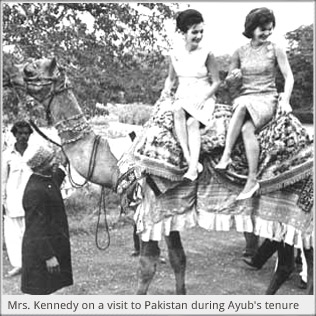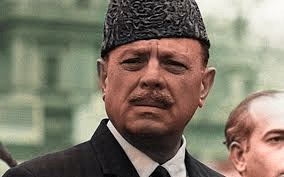On October 7, 1958, President Iskander Mirza abrogated the Constitution and declared Martial Law in the country. This was the first of many military regimes to mar Pakistan’s history. With this step, the Constitution of 1956 was abrogated, ministers were dismissed, Central and Provincial Assemblies were dissolved and all political activities were banned. General Muhammad Ayub Khan, the then Commander-in-Chief of the armed forces, became the Chief Martial Law Administrator. The parliamentary system in Pakistan came to end. Within three weeks of assuming charge on October 27, 1958, Iskander Mirza was ousted by General Ayub Khan, who then declared himself President.
General Ayub Khan gave himself the rank of Field Marshal. Corruption had become so widespread within the national and civic systems of administration that Ayub Khan was welcomed as a national hero by the people.
 Soon after coming to power, the new military government promised that they would carry out reforms in the entire government structure and would cleanse the administration of the rampant corruption. A thorough screening process of all government servants was conducted and service records were closely scrutinized. Public servants were tried for misconduct by tribunals consisting of retired judges of the Supreme Court or High Court. If charges were proven, disciplinary action such as dismissal or compulsory retirement of the public servant could take place. A public servant could also be disqualified from holding any public office for 15 years.
Soon after coming to power, the new military government promised that they would carry out reforms in the entire government structure and would cleanse the administration of the rampant corruption. A thorough screening process of all government servants was conducted and service records were closely scrutinized. Public servants were tried for misconduct by tribunals consisting of retired judges of the Supreme Court or High Court. If charges were proven, disciplinary action such as dismissal or compulsory retirement of the public servant could take place. A public servant could also be disqualified from holding any public office for 15 years.
About 3,000 officials were dismissed and many others were reduced in rank as a result of these measures. The rest of the government servants were provided with an incentive to working hard. Similarly, a law called the Elective Bodies Disqualification Order, popularly known as E. B. D. O., was promulgated for the disqualification of politicians. Under this law, a person could be disqualified from being a member of any elective body till December 31, 1966. Under this harsh law, several politicians like Suhrawardy and Qayyum Khan were disqualified. The E. B. D. O., particularly its application, was severely criticized in the legal and political circles throughout Pakistan.
After taking over, Ayub Khan focused on the long-standing question of land reforms in West Pakistan. The land reforms included the reduction of land ceiling to 1,000 acres for non-irrigated land and 500 acres for irrigated land and with ownership rights granted to the tenants. The land in excess of these limits was taken over by the government to be distributed amongst the deserving persons.
Ayub Khan also introduced a comprehensive scheme of local government, popularly known as Basic Democracies. This scheme was enforced through the Basic Democracies Order on October 27, 1959. Basic Democracies was a pyramidal plan enabling the people to directly elect to Local Council men they knew, who would in turn elect the upper tier of the administration. Altogether there were 80,000 Basic Democrats elected. To lend legitimacy to his rule, Ayub Khan used the Basic Democrats as an electoral college, holding a referendum to seek a mandate to continue in office as President and to have the authority to frame the future Constitution of Pakistan.
The referendum held on February 14, 1960, asked the voters “if they had confidence in President Field Marshal Muhammad Ayub Khan, Hilal-i-Jurat?” With the results of the referendum, Ayub Khan was elected
 not only as President of Pakistan for five years, but also got the mandate to give Pakistan a Constitution of his choice.
not only as President of Pakistan for five years, but also got the mandate to give Pakistan a Constitution of his choice.
Ayub Khan set up a Constitution Commission which was not only given the responsibility to make recommendations on the future Constitution, but was also to examine the causes of failure of parliamentary government in Pakistan. The report of the Constitution Commission was presented to Ayub Khan on May 6, 1961. Ayub Khan was not satisfied by the findings. The 1962 Constitution was very different from the recommendation of the Constitution Commission, as Ayub Khan favored a presidential form of government. The 1962 Constitution was promulgated on March 1. This ended the three-and-a-half-year Martial Law regime of Ayub Khan. A civilian constitutional government under Ayub Khan replaced his previous military regime.
This article was last updated on Sunday, June 01, 2003






